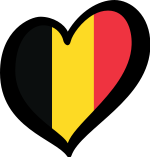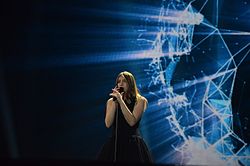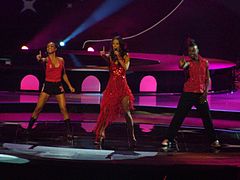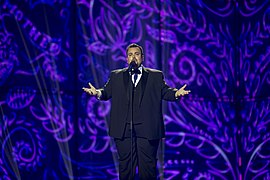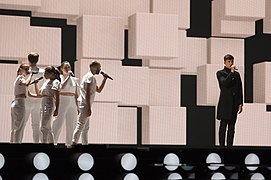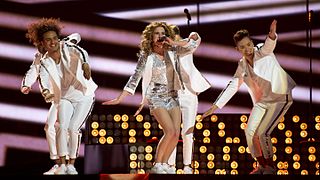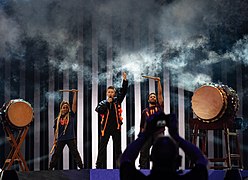Belgium at the Eurovision Song Contest
- Broadcasting company
-
 ,
, 
- First participation
- 1956
- Number of participations
- 61 (as of 2019)
- Highest ranking
- 1 ( 1986 )
- Highest Score
- 363 ( 2017 )
- Lowest Score
- 0 ( 1962 , 1965 )
- Points average (since first post)
- 48.23 (as of 2019)
- Average points per voting country in the 12-point system
- 1.95 (as of 2019)
This article looks at the history of Belgium as a participant in the Eurovision Song Contest .
Regularity of participation and successes in competition
Belgium took part in the first Eurovision Song Contest in 1956. However, apart from the Swiss victory, the remaining placements were never announced. From 1957 to 1965 Belgium was not very successful. Overall, the country took many below-average places during the period. There are also three last places in 1961, 1962 and 1965. Even if these last places were always shared with other countries. The best place in this period was 5th place out of ten participants in 1958.
From 1966 to 1969 Belgium was quite successful, reaching places in the top half of the field. Also in 1970 a place among the top ten was achieved with 8th place. However, measured against the number of participants from twelve countries, that was a rather average place. Belgium was less successful in the years that followed. In 1971 there was again only an average place with place 14. In 1972 Belgium was penultimate and in 1973 the country was again last. In 1974 there was again a place in the top ten with place 9. This was followed in 1975 again only in 15th place. From 1976 to 1978 Belgium was more successful and only got places in the top ten. In 1978 Belgium even finished second. In 1979 Belgium ended up in shared last place.
From 1980 fluctuations in Belgium's placements at the ESC have been recorded. In 1980 and 1983 the country was third from bottom, in 1981 it was 13th and in 1982 and 1984 there was a place in the top five with 4th and 5th respectively. In 1985 Belgium was then the sole last. Then came the surprise victory in 1986 with the then 13-year-old Sandra Kim and her song J'aime la vie . However, that was the last success for Belgium for a long time and it remained Belgium's only victory in the competition to this day.
From 1987 to 1992 Belgium only achieved placements in the middle or lower part of the table. In 1993 Belgium finished last for the seventh time. Due to the rules of the time, Belgium was not allowed to participate in 1994 and was therefore absent for the first time in the history of the competition in 38 years. But the return in 1995 was not very successful either. Belgium only came in 20th out of 23 participants. Also in 1996 there was only 16th place, so that Belgium was not allowed to participate again in 1997. In 1998, however, the return was successful. Mélanie Cohl reached 6th place and thus the best placement since the victory in 1986. In 1999, with 14th place, there was an average place again. In 2000 Belgium came in last, so that the country was not allowed to participate in 2001. When we returned in 2002, there was an average place again with 13th place. In 2003 it was surprisingly second. There were only three points missing to win.
In 2004, when the semi-finals were introduced, Belgium reached the final, but, like the Netherlands, was only able to achieve one place in the back of the table. Belgium participated every year from 2005 to 2009, but never qualified for the final. In the semifinals, the country only ended up in the back places. In 2010, Tom Dice was able to reach a final for the first time in six years. Belgium even won the semi-finals and reached 6th place in the final. In 2011 and 2012, however, the country was again unable to qualify for the final. In 2011, however, only two points were missing to qualify for the final. In 2013 Belgium was able to reach the final again and achieved a good result for Belgium with 12th place. In 2014, however, Belgium failed again in the semi-finals. However, Belgium was very successful for the next three years.
From 2015 to 2017, Belgium qualified for the final every year and placed in the top ten every year. In 2015 and 2017 Belgium took 4th place and in 2016 10th place respectively. In 2017, the highest number of points in Belgium was achieved with 363, after a new point record was set with 217 in 2015. After these three successful years, Belgium failed to qualify for the final in 2018 for the first time since 2014.
A total of 18 of the 60 entries ended up in the left half of the table. With eight last places, Belgium is one of the countries that came last most often. Like North Macedonia and Slovenia, the country missed the final ten times, making it one of the countries that most often failed to qualify for the final. Only Switzerland failed more often in the semifinals with eleven missed finals. So Belgium is one of the less successful countries in competition. Nevertheless, with 61 participations, Belgium is one of the longest participating countries in the competition. After all, the country has never voluntarily suspended and only had to take breaks in 1994, 1997 and 2001.
TV channel
The two Belgian TV channels, the French-speaking RTBF and the Dutch- speaking VRT , take turns participating every year, but the competition is broadcast each year by both channels with commentary in the respective language. The Walloon broadcaster first took part in 1956, and the change has been made steadily ever since. Was Belgium like For example, in 1994 the Flemish broadcaster was not entitled to participate due to a poor result in the previous year, but the French broadcaster only got a chance in 1995.
Overall, however, RTBF is significantly more successful than VRT: not only did the French-speaking channel achieve its only victory in 1986, but also two second places in 1978 and 2003. The Flemish channel's highest placements are sixth in 2010 and seventh 1967, 1969 and 1977. In addition, there are only two of the last eight places from RTBF, namely 1962 and 2000. Before the sixth place in 2010, there had been no Flemish place in the top ten for more than 30 years, reaching 1977 the group Dream Express took seventh place. On the other hand, from 2005 to 2009, as well as from 2011 and 2012, neither of the two channels managed to qualify for the final. This only changed in 2010 with a contribution from the VRT. In 2013 RTBF was able to qualify for this and achieved twelfth place. While VRT failed to qualify again in 2014, RTBF achieved the final again in 2015 and achieved the best result in years: fourth place with 217 points. The following year, the Flemish broadcaster achieved one of its best results with tenth place. In 2017, RTBF was ranked in the top 10 for the second time in a row, with another fourth place and the highest number of points in Belgium ever. VRT then failed again in the final qualification in 2018, but also RTBF 2019 for the first time since 2011.
List of posts
Color legend: - 1st place. - 2nd place. - 3rd place. - Equal points with last place. - Eliminated in the semifinals / in the qualification / in the Eastern European preliminary decision. - no participation / not qualified. - Cancellation of the Eurovision Song Contest.
| year | Interpreter | Title Music (M) and Text (T) |
language | translation | final | Semi-final / qualification |
National preliminary decision |
||
|---|---|---|---|---|---|---|---|---|---|
| space | Points | space | Points | ||||||
| 1956 | Mony Marc |
Le plus beau jour de ma vie M: Claude Alix; T: David Bee |
French | The best day of my life | k. A. / 14 | k. A. | Direct participation | internal selection | |
| Fud Leclerc |
Messieurs les noyés de la Seine M: Jean Miret, Jacques Say; T: Robert Montal |
French | You drowned lords of the Seine | k. A. / 14 | k. A. | ||||
| 1957 | Bobbejaan Schoepen |
Straatdeuntje M: Harry Frekin; T: Eric Franssen |
Dutch | Street melody | 8/10 | 5 | Eurosong 1957 | ||
| 1958 | Fud Leclerc |
Ma petite chat M / T: André Dohet |
French | My little sweetheart | 5/10 | 8th | Eurosong 1958 | ||
| 1959 | Bob Benny |
Hou toch van my M: Hans Flower; T: Ke Riema |
Dutch | So love me | 6/11 | 9 | Eurosong 1959 | ||
| 1960 | Fud Leclerc |
Mon amour pour toi M: Jack Say; T: Robert Montal |
French | My love for you | 6/13 | 9 | Eurosong 1960 | ||
| 1961 | Bob Benny |
September, gouden roos M: Hans Flower; T: Wim Brabants |
Dutch | September, you golden rose | 15/16 | 1 | Eurosong 1961 | ||
| 1962 | Fud Leclerc |
Tone nom M: Eric Channe; T: Tony Golan |
French | Your name | 13/16 | 0 | Eurosong 1962 | ||
| 1963 | Jacques Raymond |
Waarom M: Hans Flower; T: Wim Brabants |
Dutch | Why | 10/16 | 4th | Eurosong 1963 | ||
| 1964 | Robert Cogoi |
Près de ma rivière M: Robert Cogoi |
French | Close to my river | 10/16 | 2 | internal selection | ||
| 1965 | Lize brand |
As het weer lente is M: Jef van den Berg; T: Jaak Dreesen |
Dutch | When it's spring again | 15/18 | 0 | Eurosong 1965 | ||
| 1966 | Tonia |
Un peu de poivre, un peu de sel M: Paul Quintens; T: Phil van Cauwenbergh |
French | Some pepper, some salt | 4/18 | 18th | Eurosong 1966 | ||
| 1967 | Louis Neefs |
Ik heb zorgen M: Paul Quintens; T: Phil van Cauwenbergh |
Dutch | I am worried | 7/17 | 8th | Eurosong 1967 | ||
| 1968 | Claude Lombard |
Quand tu reviendras M: Jo van Wetter; T: Roland Dero |
French | When you come back | 7/17 | 8th | Eurosong 1968 | ||
| 1969 | Louis Neefs |
Jennifer Jennings M: Paul Quintens; T: Phil van Cauwenbergh |
Dutch | - | 7/16 | 10 | Eurosong 1969 | ||
| 1970 | Jean Vallée |
Viens l'oublier M / T: Jean Vallée |
French | Come and forget him | 8/12 | 5 | Eurosong 1970 | ||
| 1971 | Jacques Raymond & Lily Castel |
Goeiemorgen, tomorrow M: Paul Quintens; T: Phil van Cauwenbergh |
Dutch | Good morning | 14/18 | 68 | Eurosong 1971 | ||
| 1972 | Serge & Christine Ghisoland |
À la folie ou pas du tout M: Daniël Nelis, Bob Milan; T: Daniël Nelis |
French | Idolatrous or not at all | 17/18 | 55 | Eurosong 1972 | ||
| 1973 | Nicole & Hugo |
Baby, Baby M: Ignace Baert; T: Erik Marijsse |
Dutch a. | - | 17/17 | 58 | Eurosong 1973 | ||
| 1974 | Jacques Hustin |
Fleur de liberté M: Jacques Hustin; T: Franck F. Gérald |
French | Flower of freedom | 9/17 | 10 | Eurosong 1974 | ||
| 1975 | Ann Christy |
Successful zijn M / T: Mary Boduin |
Dutch, English | Could it be luck | 15/19 | 17th | Eurosong 1975 | ||
| 1976 | Pierre Rapsat |
Judy et cie M: Pierre Rapsat; T: Eric van Hulse |
French | Judy and Co. | 8/18 | 68 | Eurosong 1976 | ||
| 1977 | Dream Express |
A Million in One, Two, Three M / T: Luc Smets |
English | A million in one, two, three | 7/18 | 69 | Eurosong 1977 | ||
| 1978 | Jean Vallée |
L'amour ça fait chanter la vie M / T: Jean Vallée |
French | Love makes life sing | 2/20 | 125 | Eurosong 1978 | ||
| 1979 | Micha Marah |
Hey na na M: Charles Dumolin; T: Guy Beyers |
Dutch | - | 18/19 | 5 | Eurosong 1979 | ||
| 1980 | telex |
Euro-Vision M / T: Michel Moers, Dan Lacksman, Marc Moulin |
French | Eurovision | 17/19 | 14th | Eurosong 1980 | ||
| 1981 | Emly Starr |
Samson M: Kick Dandy, Giuseppe Marchese; T: Kick Dandy, Penny Els |
Dutch | - | 13/20 | 40 | Eurosong 1981 | ||
| 1982 | Stella |
Si tu aimes ma musique M: Fred Bekky, Rony Brack, Bobott; T: Jo May |
French | If you like my music | 4/18 | 96 | Eurosong 1982 | ||
| 1983 | pas de deux |
Rendez-vous M: Walter Verdin; T: Paul Peyskens, Walter Verdin |
Dutch | meeting | 18/20 | 13 | Eurosong 1983 | ||
| 1984 | Jacques Zegers |
Avanti la vie M: Henri Seroka; T: Jacques Zegers |
French | Get on in life | 5/19 | 70 | Eurosong 1984 | ||
| 1985 | Linda Lepomme |
Laat me nu gaan M: Pieter Verlinden; T: Bert Vivier |
Dutch | Let me go now | 19/19 | 7th | internal selection | ||
| 1986 | Sandra Kim |
J'aime la vie M: Jean-Paul Furnémont, Angelo Crisci; T: Rosario Marino Atria |
French | I love the live | 1 /20 | 176 | Eurosong 1986 | ||
| 1987 | Liliane Saint-Pierre |
Soldiers of Love M: Gyuri Spies, Marc de Coen; T: Liliane Saint-Pierre |
Dutch b. | Soldiers of love | 11/20 | 56 | Eurosong 1987 | ||
| 1988 | Reynaert |
Laissez briller le soleil M: Joseph Reynaerts, Dany Willem; T: Joseph Reynaerts, Philippe Anciaux |
French | Let the sun shine | 18/21 | 5 | Eurosong 1988 | ||
| 1989 | Ingeborg |
Door de wind M / T: Stef Bos |
Dutch | Through the wind | 19/22 | 13 | Eurosong 1989 | ||
| 1990 | Philippe Lafontaine |
Macédomienne M / T: Philippe Lafontaine |
French | My Macedonian | 12/22 | 46 | internal selection | ||
| 1991 | Clouseau |
Geef het op M / T: Kris Wauters, Jan Leyers, Koen Wauters, Bob Savenberg |
Dutch | Give it up | 16/22 | 23 | Eurosong 1991 | ||
| 1992 | Morgane |
Nous on veut des violons M: Claude Barzotti; T: Anne-Marie Gaspard |
French | We want violins | 20/23 | 11 | Eurosong 1992 | ||
| 1993 | Barbara Dex |
Someone as jij M: Marc Viegen; T: Tobana |
Dutch | Someone like You | 25/25 | 3 | Eurosong 1993 | ||
| 1994 | Not qualified | ||||||||
| 1995 | Frédéric Etherlinck |
La voix est libre M / T: Pierre Theunis |
French | The voice is free | 20/23 | 8th | Qualified directly for the final | Eurosong 1995 | |
| 1996 | Lisa del Bo |
Liefde is a kaartspel M: John Terra, Siirak Brogden; T: Daniel Ditmar |
Dutch | Love is a card game | 16/23 | 22nd | 12/29 | 45 | Eurosong 1996 |
| 1997 | Not qualified | ||||||||
| 1998 | Mélanie Cohl |
Dis oui M / T: Philippe Swan |
French | say yes | 6/25 | 122 | Qualified directly for the final | Eurosong 1998 | |
| 1999 | Vanessa Chinitor |
Like the Wind M / T: Ilia Beyers, J. Terra, Emma Hjälmås, Wim Claes |
English | Like the wind | 12/23 | 38 | Eurosong 1999 | ||
| 2000 | Nathalie Sorce |
Envie de vivre M / T: Silvio Pezzuto |
French | Lust to live | 24/24 | 2 | Eurosong 2000 | ||
| 2001 | Not qualified | ||||||||
| 2002 | Sergio & the Ladies |
Sister M: Marc Paelinck; T: Dirk Paelinck |
English | sister | 13/24 | 33 | Qualified directly for the final | Eurosong 2002 | |
| 2003 | Urban Trad |
Sanomi M / T: Yves Barbieux |
Constructed language | - | 2 / 26th | 165 | internal selection | ||
| 2004 | Xandee |
1 Life M: Marc Paelinck; T: Dirk Paelinck |
English | One life | 22/24 | 7th | Eurosong 2004 | ||
| 2005 | Nuno Resende |
Le grand soir M / T: Alec Mansion, Frédéric Zeitoun |
French | The big evening | Eliminated | 22/25 | 29 | Eurosong 2005 | |
| 2006 | Kate Ryan |
Je t'adore M / T: N. Kings, L. Greene, N. Bergwall, K. Ryan |
English | I adore you | Eliminated | 12/23 | 69 | Eurosong 2006 | |
| 2007 | The KMG's |
Love Power M: Paul Curtiz; T: Paul Curtiz, Sexyfire |
English | The power of love | Eliminated | 26/28 | 14th | internal selection | |
| 2008 | Ishtar |
O Julissi M: Michel Vangheluwe; T: Michel Vangheluwe |
Constructed language ("Ishtar") |
- | Eliminated | 17/19 | 16 | Eurosong 2008 | |
| 2009 | Copycat |
Copycat M: Miam Monster Miam; T: Jacques Duvall |
English | Imitators | Eliminated | 17/18 | 1 | internal selection | |
| 2010 | Tom Dice |
Me and My Guitar M: Tom Dice, Jeroen Swinnen; T: Tom Dice, Ashley Hickin |
English | Me and my guitar | 6/25 | 143 | 1/17 | 167 | Eurosong 2010 |
| 2011 | Witloof Bay |
With Love Baby M / T: Benoît Giaux, RoxorLoops |
English | With love baby | Eliminated | 11/19 | 53 | Eurosong 2011 | |
| 2012 | iris |
Would you? M / T: Nina Sampermans, Jean Bosco Safari, Walter Mannaerts |
English | Would you? | Eliminated | 17/18 | 16 | Eurosong 2012 | |
| 2013 | Roberto Bellarosa |
Love Kills M / T: Jukka Immonen, Iain Farquharson, Andreas Anastasiou |
English | Love kills | 12/26 | 71 | 5/16 | 75 | Eurosong 2013 |
| 2014 | Axel Hirsoux |
Mother M / T: Ashley Hicklin , Rafael Artesero |
English | mother | Eliminated | 14/16 | 28 | Eurosong 2014 | |
| 2015 | Loïc Nottet |
Rhythm Inside M / T: Loïc Nottet, Beverly Jo Scott |
English | Rhythm within | 4/27 | 217 | 2/16 | 149 | internal selection |
| 2016 | Laura Tesoro |
What's the Pressure M / T: Sanne Putseys , Louis Favre, Birsen Uçar |
English | What is the pressure? | 10/26 | 181 | 3/18 | 274 | Eurosong 2016 |
| 2017 | Blanche |
City Lights M / T: Ellie Delvaux , Emmanuel Delcourt, Pierre Domoulin |
English | City lights | 4/26 | 363 | 4/18 | 165 | internal selection |
| 2018 | Sennek |
A Matter of Time M / T: Laura Groeseneken |
English | A question of time | Eliminated | 12/19 | 91 | internal selection | |
| 2019 | Eliot |
Wake Up M / T: Pierre Dumoulin |
English | Wake up | Eliminated | 13/17 | 70 | internal selection | |
|
|
Hooverphonic |
Release Me M: Alex Callier , Luca Chiaravalli; T: Alex Callier |
English | let me go |
Cancellation due to the COVID-19 pandemic by the EBU |
internal selection | |||
| 2021 | Hooverphonic | internal selection | |||||||
National preliminary decisions
The majority of the Belgian contributions were selected via the Eurosong preliminary decision . Only in 1956, 1964, 1985, 1990, 2003, 2007, 2009, 2015 and since 2017 did the state select its contributions internally. For many years the Flemish television broadcaster made use of elaborate national preliminary rounds, which usually contained semi-finals and in 2006 also quarter-finals. Many of the preliminary stages were national hits. B. Belle Pérez ' Un mundo bailando 2006. The French-speaking broadcaster, in contrast to the Dutch-speaking broadcaster, relied on preliminary decisions with very few participants. In 2012 and 2013 the interpreter was selected internally and the contribution was selected from two or three songs. In 2014 VRT hosted a large-scale Eurosong with three casting rounds, a callback round, three semi-finals and a final. Ruslana , the winner of the ESC 2004, was a member of the jury . The last preliminary decision took place in 2016 with five participants.
languages
According to the change of television channel, the language in which the contributions are presented usually also changes. The Walloon contributions were presented entirely in French up to and including 2000 and 2005, in 2003 Sanomi was presented in a fantasy language before one contribution was presented completely in English in the semifinals in 2007 and 2009. However, since 2009 Belgium has been singing in English throughout.
In the past, however , VRT has often used the opportunity to present its contribution in whole or in part in English, if the rules allowed it, e.g. B. 1975, when the song changed to English from the second verse, and in all Dutch contributions since 1999. In 1977, according to the rules, each country should have presented its song in the national language, but Belgium - like Germany - before the regulation was announced had already chosen his contribution, both countries were allowed to compete with an English-language song. In 2008 there was another song in imaginary language with O Julissi Na Jalini by Ishtar .
Some contributions were also recorded in the other national language as well as in the third national language German and English.
Commercial success
The only Belgian winner, Sandra Kim , hit the charts in several countries across Europe with her winning title J'aime la vie in 1986. It did best in the Netherlands (2nd place) and Austria (6th place). In Germany it only reached place 50, in Switzerland place 29.
Despite poor performances in 2004 and 2006, both Xandee and Kate Ryan's contributions became number one hits in Belgium. The Walloon contributions of recent years have been far less commercially successful. In the last few years the Belgian finalists reached the following positions: Tom Dice came in at number 1 in the Belgian and number 20 in the German charts. Roberto Bellarosa achieved 6th place in Belgium and 90th place in Germany with his contribution. In 2015 Loïc Nottet reached number 1 in Belgium, 21st in Germany, 31st in Great Britain and 50th in Austria.
Competitions held
| year | city | venue | Moderation |
|---|---|---|---|
| 1987 | Brussels | Palais du Centenaire | Viktor Lazlo |
List of conductors
| year | conductor | |||||||
|---|---|---|---|---|---|---|---|---|
| 1956 | Léo Souris | |||||||
| 1957 | Willy Berking | |||||||
| 1958 | Dolf van der Linden | |||||||
| 1959 | Francis Bay | |||||||
| 1960 | Henri Segers | |||||||
| 1961 | Francis Bay | |||||||
| 1962 | Henri Segers | |||||||
| 1963 | Francis Bay | |||||||
| 1964 | Henri Segers | |||||||
| 1965 | Gaston Nuyts | |||||||
| 1966 | Jean Roderes | |||||||
| 1967 | Francis Bay | |||||||
| 1968 | Henri Segers | |||||||
| 1969 | Francis Bay | |||||||
| 1970 | Jack Say | |||||||
| 1971 | Francis Bay | |||||||
| 1972 | Henri Segers | |||||||
| 1973 | Francis Bay | |||||||
| 1974 | Pierre cipher | |||||||
| 1975 | Francis Bay | |||||||
| 1976 | Michel Bernholc | |||||||
| 1977 | Alyn Ainsworth | |||||||
| 1978 | Jean Musy | |||||||
| 1979 | Francis Bay | |||||||
| 1980 | ||||||||
| 1981 | Giuseppe Marchese | |||||||
| 1982 | Jack Say | |||||||
| 1983 | Freddy Sunder | |||||||
| 1984 | Jo Carlier 2 | |||||||
| 1985 | Curt-Eric Holmquist | |||||||
| 1986 | Jo Carlier | |||||||
| 1987 | Freddie Sunder | |||||||
| 1988 | Daniel Willem | |||||||
| 1989 | Freddie Sunder | |||||||
| 1990 | Ronny Brack | |||||||
| 1991 | Roland Verlooven | |||||||
| 1992 | Frank Fievez | |||||||
| 1993 | Bert Candries | |||||||
| 1994 | Not qualified | |||||||
| 1995 | Alec Mansion | |||||||
| 1996 | Bob Porter | |||||||
| 1997 | Not qualified | |||||||
| 1998 | ||||||||
Scoring
The following countries received the most points from or awarded the most points to Belgium (as of 2019):
|
|
|
|
|||||||||||||||||||||||||||||||||||||||||||||||||||||||||||||||||||||||||||||||||||
Award of the highest rating
Since 1975 Belgium has given the highest number of points in the final to 21 different countries, seven times of which to Great Britain. In the semi-finals, Belgium gave 13 different countries the points, three of which went to Armenia and the Netherlands.
|
|
|||||||||||||||||||||||||||||||||||||||||||||||||||||||||||||||||||||||||||||||||||||||||||||||||||||||||||||||||||||||||||||||||||||||||||||||||||||||||||||||||||||||||||||||||||||||||||||||||||||||||||||||||||||||||
various
- Among the seven countries that took part in the first edition of the Eurovision Song Contest in 1956, Belgium was the one that had to wait the longest for its first victory: in 1986 it took part for the 31st time.
- Belgium has never voluntarily given up participation, the dropouts in 1994, 1997 and 2001 all resulted from a poor position in the previous year.
- The country that Belgium has given the most points on average is Armenia: including the 2006 semi-finals, the country received an average of 11.3 points - twice 12 and once 10. Belgium has received the most points since 1975 from its Dutch neighbors - 6 .3 on average.
- Belgium is the country whose contributions were most frequently recorded - at least not by the artist who presented the song in the competition (both contributions 1956, 1962, 1971 and 1979). In addition, in the competition in general, the Belgian entry in 1979 was the last to fall under this category.
- Belgian singer Fud Leclerc is the only singer in the competition who has represented the same country in the same language four times.
- In the 2007 semi-finals, Belgium received a total of 14 points - 12 of which came from Georgia, which was participating for the first time .
Impressions
Individual evidence
- ^ Glen Webb: Belgians Create Feel Good Factor. Eurovision.tv, May 11, 2008, accessed May 27, 2008 .
- ↑ Detailed overview: conductors for Belgium. Retrieved June 24, 2018 .
